One way to compete in outdoor power equipment sales is to stay on top of the emerging trends in the category. In the May 2016 issue of Hardware Retailing, we spoke with a few high-power retailers who are successful selling this category to see what they believe are the top trends hitting the market today. Below are five trends these retailers identified.
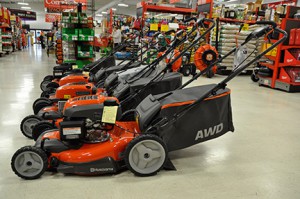 Quality Equipment
Quality Equipment
When Dan Stroinski started selling outdoor power equipment 14 years ago at D & J Farm and Home Hardware Hank in Thorp, Wisconsin, he thought he would have to stock low-priced equipment in order to compete. He quickly learned that wasn’t the case.
“Consumers aren’t worried about you being the cheapest,” he says, “but they do want you to have quality products and be able to service what you sell.”
Ian McNaughton, owner of Gravenhurst Home Hardware in Gravenhurst, Ontario, says this is a trend he’s noticing among his customers as well.
“The gap between disposable-type mowers and quality units is widening,” he says. “Most of the equipment in the big boxes today are throwaway pieces. They are so cheap that consumers don’t expect to fix them. The big boxes may not even have parts available to fix them. We’re not interested in that throwaway business. We invest in quality equipment because that’s what our customers want.”
A quality product offers more opportunities for future sales, too. If you establish good customer relationships from the beginning, they will return for maintenance and repair long into the future.
This trend is providing an opportunity for independent retailers to differentiate from the big boxes. The savvy retailer will compete on quality, not price, in the outdoor power equipment category.
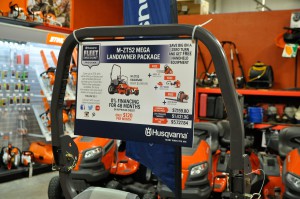 Financing
Financing
With larger pieces of equipment, more customers are opting for a financing option to help with the purchase cost. Working through a third-party financer, Stroinski offers 0 percent for 42 months to qualified buyers. He uses financing services from financial companies GE Financial and Sheffield Financial to make the financing process easy for both him and his customers. While the financer’s 2 percent fee comes off of his margin, he says customers usually finance the more expensive units, which carry a larger margin. “The use of financing is growing,” he says. “Now, it’s a tool we use in all of our advertising. About 10 to 15 percent of our customers use this option, mainly on riders and zero turn mowers.”
Roy Mason, vice president at Race Brothers Farm & Home Supply in Carthage, Missouri, says he’s using consumer finance a lot more to close the sale in his outdoor power equipment department. “One of the biggest trends we’ve seen lately is the evolution of the financing options,” he says. “Manufacturers have 0-percent financing options, which have stepped up the consumer’s purchasing power. About 60 percent of the equipment we sell today is financed.”
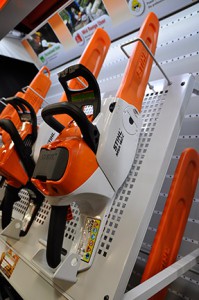 Rechargeable Options
Rechargeable Options
Ethanol fuel has posed a problem for small engine operators ever since it came into the main stream market. Additives are available, but frustration with ethanol fuel as well as the quest for zero emissions has more manufacturers developing rechargeable options for all types of outdoor power equipment. Cub Cadet offers a 48-volt rechargeable zero-turn riding mower. Many manufacturers also offer battery operated versions of hand-held equipment.
“Battery technology continues to get better,” says Ron Gladieux, president of Gladieux Do it Best Home Center in Oregon, Ohio. “It’s a time saver for the user and is better for the environment. What happened with batteries in the power tool category a few years ago is now moving to the outdoor power equipment category.”
And as with power tools, it might take consumers a while to get used to the idea of running outdoor power equipment off a batter. He stocks a battery-operated chain saw from Stihl. In the past, consumers would have thought a battery-powered saw was little more than a toy, today’s technology has advanced. The saw from Stihl can handle tough jobs and last up to 40 minutes on a charge. One major benefit, says Gladieux, in addition to its low impact on the environment, is that it starts quickly and doesn’t require mixing fuel.
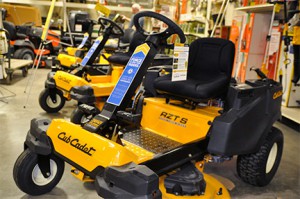 Zero-Turn
Zero-Turn
Once found mostly in the professional market, zero-turn mowers are also becoming more popular in the consumer market.
“We are seeing more customers switch from the tractor-style of mower to the zero-turn mower,” says Mason.
The benefits of the zero-turn style make it an easy choice for any user, even if it cost slightly more. This style of mower gets the job done faster and makes more efficient use of fuel because it spends less time turning corners. It is also easier to use because there is less strain involved turning the wheel.
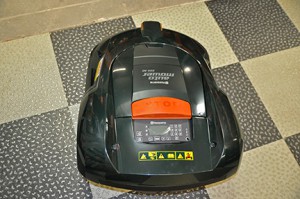 Auto Mowers
Auto Mowers
Remember the Roomba®? Now you can have a robot mow your lawn. Gladieux is giving his customers a preview of the Automower® from Husqvarna.
“This type of automatic mower has been popular in Europe for a while,” Gladieux says, “but the U.S. has a different culture where people tend to view caring for their lawns as more of a pastime.” Manufacturers are hoping, however, that the trend will catch on in the U.S. market. With his vendor Husqvarna beginning to promote its robotic mower in the U.S., he wants to be on the cutting edge of the trend.
“We always want to be ahead of whatever trend is on the market so we have it before our competition,” he says.
The auto mower operates within a perimeter designated by the homeowner. The mower can be set to cut the grass whenever the homeowner chooses, even at night. At the end of the cut, it returns to a docking station where the battery recharges. Frequent cuttings are best, as the small, razor-blade like cutters slice the grass into fine pieces that do not need raking.
 Hardware Retailing The Industry's Source for Insights and Information
Hardware Retailing The Industry's Source for Insights and Information







